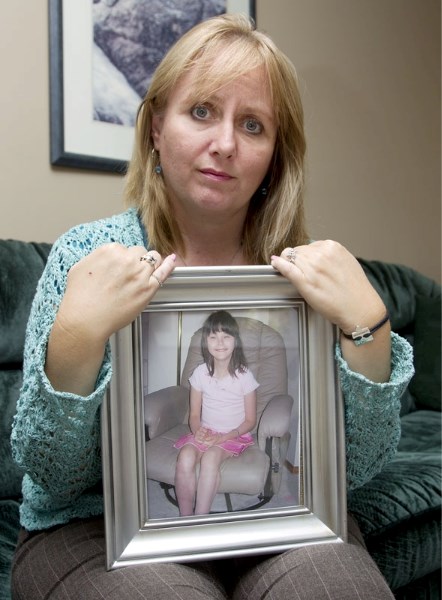The family of a 13-year-old girl who died shortly after leaving foster care argued Wednesday the government should pay legal fees for their representation at a provincial fatality inquiry looking into her death.
Samantha Martin died in December 2006 after collapsing from an apparent heart attack. The inquiry is supposed to determine what caused the girl’s cardiac arrest.
Martin lived in foster care for most of her life; she was born with a rare chromosomal disorder and the government insisted the Martin family place her there to receive the necessary medical supports.
The fatality inquiry heard some testimony earlier this year and Velvet Martin, Samantha’s mother, represented the family and Samantha at the hearing without legal help.
The foster parents and the department of children’s services both have lawyers at the hearing, which in addition to determining why Samantha died, is supposed to offer recommendations to prevent similar deaths. The inquiry is meant to be an open process and is prohibited from finding anyone criminally or civilly responsible for the girl’s death.
Robert Lee, a lawyer who was hired to argue for the funding, argued Wednesday in front of Queen’s Bench Justice J.J. Gill that the Martin family should also have legal representation. He cited a Supreme Court decision allowing superior courts to order funding in rare cases.
The Supreme Court created what it called an “Okanagan order” several years ago that forces governments’ to pay legal costs, but limits them to very specific circumstances.
Orders like that have never been used in fatality inquiries before anywhere in Canada. In his argument, Lee acknowledged he was facing an uphill battle for the funding, but insisted it was necessary.
“I am pushing the envelope of the law.”
Lee argued that the inquiry judge has the power only to recommend funding, but the provincial government does not have to abide by that recommendation. He said if Gill, a superior court justice, ordered the funding the government would be forced to provide it.
Doreen Mueller, a lawyer representing the government, argued the Supreme Court decision set out a test for providing funding and this case does not meet it.
“The Supreme Court has made it abundantly clear that an Okanagan order is extremely rare.”
She said in the case of a fatality inquiry, it is a search for answers and no one person is on trial, so no one’s rights will be infringed.
“It is just unnecessary. There is no need for and no injustice from not providing such funding.”
Mueller said, while she understands completely why the Martin family is taking part, they are not required to even be part of the fatality inquiry.
“They are not forced to participate, in a legal sense.”
Previous court decisions that have granted Okanagan orders have centred around language rights, land rights and free speech, but Lee said this case would be much more important.
“We are talking about saving children’s lives.”
He said if the inquiry doesn’t have a forceful advocate for the rights of foster children, it would produce weak recommendations. Lee said the order for funding had the potential to help prevent future deaths.
“The legacy of this order will never be known and yet, I submit, there will be children who will be alive because of this order.”
Outside court, Lee said since child services is represented at the inquiry it only make sense for the government to provide representation for the Martin family and Samantha.
“Child welfare has hired a lawyer to represent them in this fatality inquiry. If they have a lawyer to represent their interest then I think that proves the child should have a lawyer to represent their interest.”
The inquiry has a neutral lawyer who is there to present the evidence, but Lee argued with a lawyer for children’s services and one for the foster parents it is unbalanced.
“You have two people representing the side that needs to change.”
Martin said she has felt out-gunned in the hearing as the only person at the table who is not a lawyer.
“There are absolutely decisions that never would have been made had it been a lawyer in that decision instead of a mommy.”
Martin said, while she has an obvious personal stake, her concern is not for her daughter, but for the thousands of other children in provincial care.
“There is nobody speaking for the children and this is beyond my daughter Samantha,” she said. “I hate being the one that needs to do it, but some things are more important than sitting silent.”
Gill did not issue a ruling Wednesday, but suggested he would have a written decision soon. The fatality inquiry is scheduled to resume on Nov. 2.




